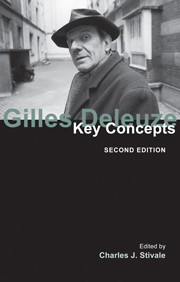17 - Philosophy
from Part III - FOLDS
Summary
I
In Gilles Deleuze's voluminous writings, the nature of philosophy is riven by a problem that, roughly speaking, emerges between its conceptualization and its practice. On the one hand, Deleuze expresses an abiding faith in philosophy that remains unique among his contemporaries. It is no secret that the history of modern philosophy consists in its perpetual displacement by other disciplines. The purpose of philosophy has been ceded to poetry (Heidegger) and conceded to literature (Rorty), dispatched by critical theory (Adorno) and submitted to deconstruction (Derrida), claimed by communications (Habermas) and reduced to biology (Lakoff). We seem to have reached the dire moment when philosophy no longer compels our confidence or, worse still, lapses into an even less credible polemic: “the best lack all conviction, while the worst/Are full of passionate intensity”. As Deleuze and Guattari admit, “it may be that believing in this world, in this life, has become our most difficult task, or the task of existence yet to be discovered on our plane of immanence today” (WIP: 75). It is remarkable, then, that in the face of the broad inclination to sell philosophy short Deleuze effectively doubles down on the discipline, dwelling in the history of concepts, declaring his classical affinities, and even calling himself a metaphysican (in the sense, he adds, that Bergson wrote metaphysics). There can be no doubt: Deleuze believes in philosophy.
- Type
- Chapter
- Information
- Gilles DeleuzeKey Concepts, pp. 216 - 226Publisher: Acumen PublishingPrint publication year: 2011

